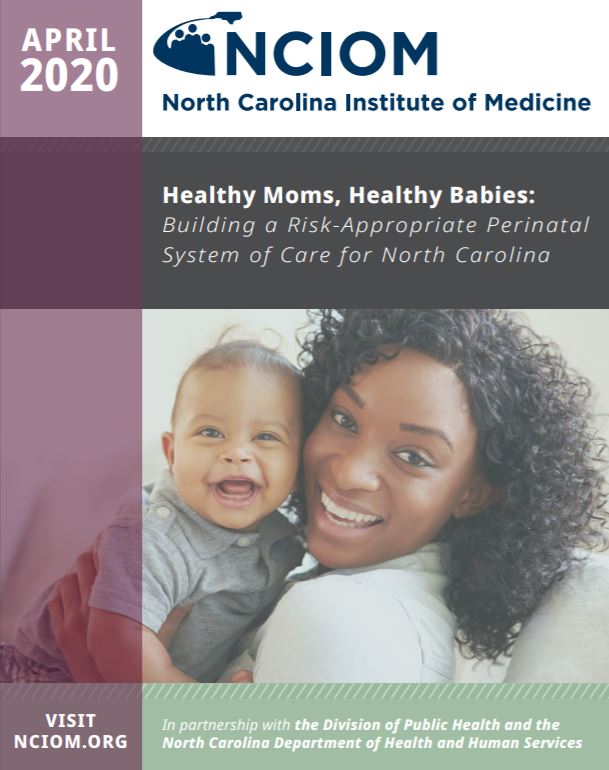


The North Carolina Institute of Medicine (NCIOM), in collaboration with the North Carolina Department of Health and Human Services (NC DHHS), is sharing a recently published report with 20 recommendations designed to push the state forward to reduce maternal and infant mortality and morbidity, with a special focus on addressing existing racial disparities in these outcomes across the state.
The task force recommendations call on the state government, health care providers, health professional trade organizations, health care payers, and other stakeholders to adopt national maternal and infant risk-appropriate level of care standards in North Carolina, re-establish our state's perinatal
and neonatal outreach coordinator program, engage insurers in quality improvement efforts that address racial and ethnic disparities in care, and expand perinatal access to mental health services. The recommendations also request support for the development of a regionalized and risk-appropriate perinatal system of care addressing both clinical and non-clinical health needs of mothers and babies.
"This task force has included the voices of patients and professionals from North Carolina to develop the best recommendations we could based on the data," said LaToshia Rouse, parent advisor with the Newborn Individualized Developmental Care and Assessment Program (NIDCAP) and a task force co-chair. "The data is our story with the tears wiped away, and by the task force adding the patient voice (sometimes with tears), it has allowed our stories to be fully incorporated into the recommendations presented. The moms, babies, and families of North Carolina deserve to have health care, doula support, and a voice at all levels of care. We have to listen!"
North Carolina has not kept pace with the nation's improvements in maternal and infant health. Infants in our state are more likely to die than those in 39 other states, and while our maternal death rate is slightly better than the national average, it still equates to approximately 33 deaths per year. The outcomes are especially dire for women and infants of color.
To address these disparities, in 2016 the Women's Health Branch of NC DHHS released a 12-point Perinatal Health Strategic Plan. The plan included three main goals: improving health care for women and men, strengthening families and communities, and addressing social and economic inequities. Goal 3E called for North Carolina to improve risk-appropriate care through a regional perinatal system, which the North Carolina General Assembly mandated in Session Law 2018-93. The NCIOM Task Force on Risk-Appropriate Perinatal Systems of Care convened in partnership with NC DHHS and the North Carolina Division of Public Health to respond to this need.
The report and recommendations focus on access to high-quality preconception (before pregnancy), prenatal (during pregnancy), labor and delivery, postnatal (after pregnancy), and interconception (between pregnancies) care. The task force explored strategies that have been shown to improve outcomes for women and infants of color in particular.
The North Carolina Institute of Medicine (NCIOM) is an independent, quasi-state agency that was chartered by the North Carolina General Assembly in 1983 to provide balanced, nonpartisan information on issues of relevance to the health of North Carolina's population. For more information, visit www.nciom.org.
###